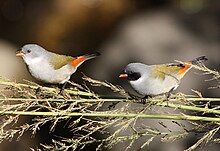Coccopygia
Appearance
| Coccopygia | |
|---|---|

| |
| Swee waxbill (Coccopygia melanotis) | |
| Scientific classification | |
| Domain: | Eukaryota |
| Kingdom: | Animalia |
| Phylum: | Chordata |
| Class: | Aves |
| Order: | Passeriformes |
| Family: | Estrildidae |
| Subfamily: | Estrildidae |
| Genus: | Coccopygia Reichenbach, 1862 |
| Type species | |
| Fringilla melanotis swee waxbill Temminck, 1823
| |
| Species | |
|
Coccopygia quartinia | |
Coccopygia, is a genus of small seed-eating birds in the family Estrildidae. They are distributed across central and southern Africa.
Taxonomy
[edit]The genus Coccopygia was introduced in 1862 by the German naturalist Ludwig Reichenbach.[1] The name combines the Ancient Greek kokkos meaning "scarlet" with -pugios meaning "-rumped".[2] The type species was designated as the swee waxbill by Richard Bowdler Sharpe in 1890.[3][4] The genus Coccopygia is sister to the olivebacks in the genus Nesocharis.[5]
Species
[edit]The genus contains three species:[6]
| Image | Scientific name | Common Name | Distribution |
|---|---|---|---|
 |
Coccopygia quartinia | Yellow-bellied waxbill | East Africa |
 |
Coccopygia melanotis | Swee waxbill | Southern Africa |
| Coccopygia bocagei | Angola waxbill | Angola |
References
[edit]- ^ Reichenbach, Ludwig (1862). Die Singvögel als Fortsetzung de vollständigsten Naturgeschichte und zugleich als Central-Atlas für zoologische Gärten und für Thierfreunde. Ein durch zahlreiche illuminirte Abbildungen illustrirtes Handbuch zur richtigten Bestimmung und Pflege der Thiere aller Classen (in German). Dresden and Leipzig: Expedition Vollständigsten Naturgeschichte. p. 23.
- ^ Jobling, James A. (2010). The Helm Dictionary of Scientific Bird Names. London: Christopher Helm. p. 112. ISBN 978-1-4081-2501-4.
- ^ Sharpe, R. Bowdler (1890). Catalogue of the Passeriformes or Perching Birds in the Collection of the British Museum. Sturnformes. Catalogue of the Birds in the British Museum. Vol. 13. London: Trustees of the British Museum. p. 305.
- ^ Paynter, Raymond A. Jr, ed. (1968). Check-List of Birds of the World. Vol. 14. Cambridge, Massachusetts: Museum of Comparative Zoology. p. 336.
- ^ Olsson, Urban; Alström, Per (2020). "A comprehensive phylogeny and taxonomic evaluation of the waxbills (Aves: Estrildidae)". Molecular Phylogenetics and Evolution. 146: 106757. Bibcode:2020MolPE.14606757O. doi:10.1016/j.ympev.2020.106757. PMID 32028027.
- ^ Gill, Frank; Donsker, David; Rasmussen, Pamela, eds. (July 2021). "Waxbills, parrotfinches, munias, whydahs, Olive Warbler, accentors, pipits". IOC World Bird List Version 11.2. International Ornithologists' Union. Retrieved 12 July 2021.
